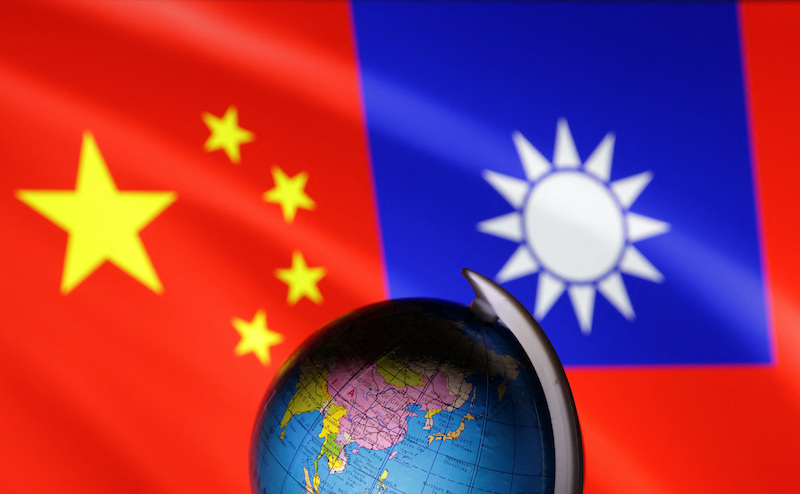Some foreign firms are looking to shift Taiwanese employees out of China after Beijing’s threat to impose the death penalty on “die-hard” Taiwanese independence separatists, sources say.
Executives and a Beijing-based lawyer said China’s new guidelines had caused Taiwanese expatriates and foreign multinationals in China to scramble to assess their legal risks and exposure.
“Several companies have come to us to assess the risks to their personnel,” said the lawyer, James Zimmerman, a Beijing-based partner at the Perkins Coie law firm. He declined to identify the firms or industries for confidentiality reasons.
ALSO SEE: China’s Central Bank Moves to Cool Bonds Market Trading
“The companies are still concerned that there may be some grey areas such as whether a benign social media post or voting for a particular political party or candidate in Taiwan elections could be interpreted as engaging in pro-independence activities,” Zimmerman said.
Some 177,000 Taiwanese were working in China as of 2022, according to the most recent Taiwan government survey. Taiwanese staff are employed by many multinationals in China, given their linguistic abilities and cultural familiarity with the country.
Many more work for the myriad Taiwanese firms that operate in China and have, by the Taiwan government’s estimate, invested more than $200 billion since 1991, helping fuel China’s growth to become the world’s second-biggest economy.
Meetings on employees’ safety
Some foreign corporations operating in China have held meetings with employees on safety, according to two executives who asked not to be named due to the sensitivity of the matter.
Another source, who was briefed on the matter, said some Taiwanese staff in China have received and accepted the option to leave the country.
China views democratically governed Taiwan as its own territory. Taiwan President Lai Ching-te rejects Beijing’s sovereignty claims, saying only Taiwan’s people can decide their future. He has denounced China’s new guidelines.
The June 21 guidelines criminalize promoting Taiwan’s entry to international organizations where statehood is a condition, having external official exchanges and suppressing parties, groups and people that promote “reunification”.
Also illegal are “other acts that seek to separate Taiwan from China” – phrasing that allows Beijing to interpret the rules broadly, according to legal experts.
Among “the ringleaders or those who have committed serious crimes”, the guidelines say, “if the harm to the country and the people is particularly serious and the circumstances are particularly bad, they may be sentenced to death.”
The regulations do not further specify who might be subject to the death penalty.
Guidelines target extreme minority, China says
Asked for comment on how companies and Taiwanese employees are reacting to the guidelines, China’s foreign ministry said in a statement: “Using criminal law measures to punish criminal separatist elements and uphold the country’s core interests is a common practice for all countries.
“It needs to be emphasized that the relevant legislative document targets the extreme minority of diehard ‘Taiwan independence’ elements and their separatist activities, and does not implicate the vast majority of Taiwan compatriots,” the ministry said.
China’s Taiwan Affairs Office did not respond to a request for comment. Last week it said the vast majority of Taiwanese have nothing to worry about and can come “in high spirits”.
Taiwan’s Mainland Affairs Council, which oversees relations with Beijing, said in a statement: “The government reminds Taiwanese businesspeople and Taiwanese employees in mainland China that they must pay more attention to their personal safety now. The risk is indeed increasing.”
Taiwanese told ‘Avoid non-essential travel’
Last week the council urged Taiwanese people to avoid all non-essential travel to China, Hong Kong and Macau as a result of the new regulations.
The council said last month that eight retired Taiwanese military and police officers had been detained in China over the previous year. Last year it warned that Taiwanese academics were being detained and interrogated upon entry to China, even if they were on formal exchange programmes.
One of the executives who spoke to Reuters – a senior official who works with Taiwan investors in China – said his phone lit up after China announced the new guidelines as people discussed what they could mean for their work.
He said the guidelines add to the uncertainty of doing business in China, coming on the heels of such measures as China’s anti-espionage law and its national security law for Hong Kong.
The second executive, who works for a large multinational whose Taiwanese executives frequently go on business trips to China, said they had been having regular meetings with senior managers to assess the danger and whether to withdraw those working in the country.
“It’s not yet gotten to the stage of deciding not to send them there, but we are reviewing the risk daily,” the executive said.
Wen-Ti Sung, a fellow at the Atlantic Council’s Global China Hub, said the guidelines would force foreign companies to “either move their operations out entirely to keep Taiwanese talent or they stop hiring Taiwanese talent.”
That would mean that “even fewer Taiwanese will be working or living in China, thereby making Beijing’s attempts to win over their hearts and minds even harder,” Sung said.
Beijing condemns Taiwan’s Lai as a “separatist” and staged war games shortly after his May inauguration. Taiwan has complained of ramped up Chinese pressure since Lai won the election in January, including ongoing military actions, trade sanctions and coast guard patrols around Taiwan-controlled islands next to China.
Lai has repeatedly offered talks with China but been rebuffed.
- Reuters with additional editing by Jim Pollard
ALSO SEE:
Taiwan Issues Travel Warning After China’s Execution Threat
China Unveils Video of Simulated Invasion of Taiwan
President Lai Urges China to Accept Taiwan’s Existence – Nikkei
Taiwanese Firms Eye SE Asia Boltholes in Case China Invades – FT
China Defence Spending up 7% Amid Taiwan Reunification Change
Taiwan Chip Firms Migrate to Japan, TSMC to Open Kyushu Plant






















